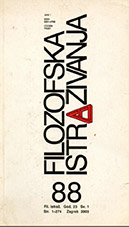Arhaična politika anarhično mišljenje
Archaic Politics and Anarchic Thinking
Author(s): Alen TafraSubject(s): Ethics / Practical Philosophy, Political Philosophy, Existentialism, Phenomenology, Hermeneutics
Published by: Hrvatsko Filozofsko Društvo
Summary/Abstract: The starting point of this essay is a Reiner Schürmann's book on Heidegger's philosophy, which at the same time attempts to establish the genealogy of the epochal principles. According to Schürmann, in the place of the former metaphysicopolitical structure princeps-principium, an-archic and a-teleocratic epochal constellation of postmodernity ushers a new anarchy principle. It is in these rare times of interregnum when the question of the difference between what is present and its presencing ultimately arises, indicating that the origin is different from arche and princeps-principium, and that it founds nothing. The fact that the given situation has been made transparent in the most instructive manner by Heidegger himself, contributes even more to the confusion about his earlier endeavor to bring the renewal of the authentic historical Dasein. In the wake of some recent works, this essay aims to prove the decisive influence of cultural and historical Zeitgeist on the Heidegger's archaic politics. This effect uncovers itself more directly in the case of intertextual exchange with companion thinkers of conseiVative revolution, as well as in some vague archetypal analogies with his contemporaries - teachers of Tradition (Guenon, Evola). On the other hand, Heidegger's personal experience and typical motives from his occasional dealing with the political (Antigona, Holderlin), point at another controversy arising at the moment of decline of tradition and birth of philosophy: Straussian conflict between philosophy and city, individual and society. Both perspectives- archaic one of comparative mythology, as well as one of anarchic thinking - reveal hypocrisy and illusion of an intellectual or philosophical politics. In this light, the Heidegger case dissolves in the unsuccessful venture to quench the postmodern revolt against the modern world on the well of occulted beginning, while paradoxical nexus of metaphysics and politics, anarchy and principles of archaic societies, remains unsolvable.
Journal: Filozofska istraživanja
- Issue Year: 23/2003
- Issue No: 01
- Page Range: 153-178
- Page Count: 26
- Language: Croatian

